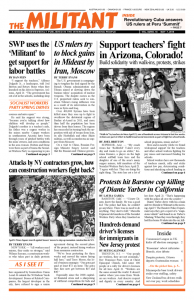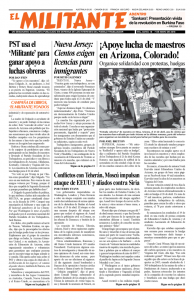The U.S. government is campaigning to toughen the deal signed by the Barack Obama administration and Tehran aimed at slowing down the Iranian rulers’ acquisition of nuclear weapons. The dispute occurs as the U.S. propertied rulers seek to constrain Tehran’s rising influence won as a result of its intervention in the wars in Syria and Iraq.
Over 400,000 Syrians have been killed since they rose up to fight to overthrow the dictatorial regime of Bashar al-Assad in 2011, and more than half the population has been driven from their homes. The regime has succeeded in turning back the opposition with aid of troops from Iran, its ally Hezbollah and other Shiite militias, as well as murderous air support from Moscow.
On a visit to China, Russian Foreign Minister Sergey Lavrov said that the Russian and Chinese governments, signatories to the deal with Tehran, would “obstruct attempts” by Washington to alter the agreement. Under the deal’s terms, some sanctions on Iran, sanctions that fall hardest on working people, were relaxed in exchange for Tehran pausing its moves to develop nuclear weapons.
The Donald Trump administration says it will decide by May 12 whether to quit the deal and resume full sanctions against Iran. Washington, with a vast nuclear arsenal, is the only government to have ever used nuclear weapons, incinerating towns — and people — of Hiroshima and Nagasaki in Japan in 1945.
Through their military intervention in Syria and Iraq, Iran’s capitalist rulers have conquered a land corridor to Hezbollah in Lebanon to enforce their counterrevolutionary political influence. With Tehran establishing bases in Syria, including close to the Israeli border, the stakes have risen for the Israeli rulers and U.S. imperialism in pushing back the Iranian government’s weapons programs and expanding reach.
Washington, which has over 2,000 troops in Syria, and tens of thousands more stationed across the Middle East, wants to add measures to the agreement that would punish Iran for the development of ballistic missiles and extend the deal’s restrictions beyond the 2025 date when it starts to expire. The governments of France, Germany and the U.K. say they back further sanctions targeting Tehran’s ballistic missiles. French President Emmanuel Macron met with President Trump April 24 and urged Washington to stay in the agreement, but also prepare new measures that take up Washington’s demands.
Others are pressing the Trump administration to go after Tehran’s ability to help fund the Assad regime and its ongoing war against the Syrian people. Writing in the Wall Street Journal, leaders of a conservative lobby group calling itself the Foundation for Defense of Democracies called for the reimposition of sanctions on Iranian banks that provide credit to the Syrian rulers and on companies that fund the Iranian Revolutionary Guard and Hezbollah, military forces that have been decisive to the Syrian regime’s advances against opposition forces on the battlefield.
The deadly impact of the Iranian rulers participation in the wars wracking the region lay behind the widespread working-class-led protests that swept 90 cities and towns in Iran in early January.
Israeli Defense Forces launched missile strikes at Syrian government military positions after a mortar shell landed inside Israel, April 23. The Syrian government has been extending its control over parts of the country through assaults on towns held by opposition forces close to the Israeli border and through airstrikes and a siege of eastern Ghouta, near Damascus.
U.S. rulers face challenge from Moscow
The U.S. rulers also face a growing challenge to their economic and political sway in the region from Moscow’s rising intervention in the Mideast. To reinforce Assad the capitalist rulers in Russia are considering whether to supply his regime with anti-aircraft defense systems that could be used to shoot down Israeli missiles and planes. Tel Aviv has been using its superior air power to try to prevent Tehran and Hezbollah from setting up operations near the border. Specially trained Russian soldiers would be deployed to Syria to operate the anti-aircraft battery. Tel Aviv has asked Moscow to withhold the weaponry.
Moscow has helped Assad push back opposition forces and impose “de-escalation” arrangements that force them to give up their heavy weapons and be moved to Idlib or Homs in the north of the country.
Assad’s military has now taken the town of Dumayr near Damascus, after a siege and carpet bombing. The Turkish government has gotten agreement to transport opposition fighters to Afrin, a Kurdish area in northwest Syria that Turkish forces now control following their invasion and assault against the Kurdish-led Syrian Democratic Forces there earlier this year. The Turkish rulers want to sharply expand the Arab population in hopes of using them as a bulwark of support against the Kurds who historically inhabited the area.
The Kurds are the world’s largest nationality without their own homeland — over 30 million strong, divided among Turkey, Syria, Iraq and Iran.

